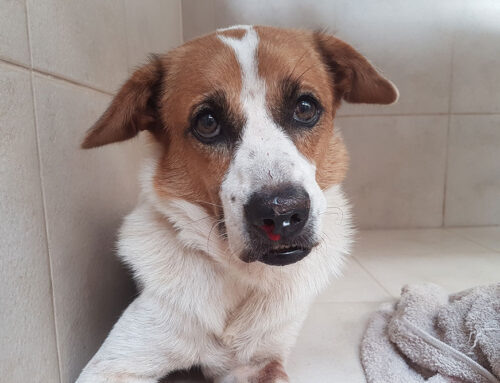As your pet grows older, they will likely require extra care and attention to help them enjoy their golden years to the fullest. Here are 10 easy ways to support your senior pet, so they will stay happy, healthy, and forever young at heart.
#1: Tailor your senior pet’s nutrition
As your pet ages, their nutritional needs change, especially if they develop a chronic health condition. Depending on their health status, they may need dietary changes in protein levels, fiber content, and fat and calories. You also may need to switch to a senior pet diet that is fortified with antioxidants, omega-3 fatty acids, and other ingredients that support joint and cognitive function. In addition, if your pet has organ disease or a chronic condition, such as kidney disease or diabetes, they may benefit from a prescription diet that has been carefully formulated as part of a multimodal treatment plan.
#2: Adapt exercise routines for your senior pet
Keeping your senior pet active is crucial for maintaining muscle mass and joint health, but you will need to accommodate physical limitations, such as arthritis, heart disease, or respiratory disorders. Opt for shorter, more frequent exercise sessions with low-impact activities, such as swimming, walking, and gentle games of fetch or pounce.
#3: Focus on your pet’s healthy body condition
Obesity is prevalent in cats and dogs, and a senior pet with a decreased metabolism and other chronic conditions is more likely to gain weight. Obese pets are at increased risk for a multitude of health issues, including:
- Skin and urinary infections
- Diabetes
- Hypothyroidism
- Cushing’s disease
- Heart disease
- Respiratory disorders
- Kidney and liver dysfunction
- Hypertension
- Arthritis
- Increased anesthetic complications
- Heatstroke
- Some cancers
Help your pet maintain an ideal body condition by focusing on regular exercise, quality nutrition, and appropriate calorie intake. Pets kept at a lean body condition can live two years longer than their heavier counterparts.
#4: Provide mental stimulation for your senior pet
Brain games are good for your pet at every life stage, but especially as they age. Senior pets often suffer from cognitive dysfunction and become confused, disoriented, and forget what they once knew, such as their bed or food location, their name, or the correct side of the door to go outside.
Keep your pet’s mind sharp by:
- Offering food and treat puzzles
- Training new and old tricks
- Enrolling in canine sports
- Scheduling playdates with friendly pets and people
- Exploring new environments
- Enjoying natural behaviors (e.g., sniffing, digging, scratching, climbing, chasing)
#5: Upgrade your senior pet’s bed
Although your pet may like to burrow deep into their bed for a nap, soft bedding doesn’t support stiff, sore joints. Upgrade your pet’s bed to a firm, orthopedic cushion that you cover with fleece blankets for a cozy, yet supportive, resting spot.
#6: Invest in high-quality supplements for your pet
While a well-balanced senior pet diet provides essential nutrition, supplements for various health aspects, including their joints, skin, and urinary or digestive systems, may be beneficial. However, do your research before purchasing supplements to ensure they have been tested and their efficacy claims are proven, and seek your veterinarian’s advice before starting your pet on any product.
#7: Create a senior pet-friendly environment
Senior pets require additional support to comfortably and safely navigate their environment, but you can improve your pet’s mobility by implementing these changes:
- Cover slick flooring with carpet runners, rugs, or mats.
- Install pet steps or ramps to prevent attempts to jump or climb difficult stairs.
- Plug in nightlights to boost visibility in dark hallways and rooms.
- Raise food and water bowls to avoid the need to crouch on painful joints.
- Set the thermostat to a comfortable temperature.
- Change to low-sided litter boxes.
#8: Help your senior pet with grooming
Senior pets can develop various conditions that cause dry skin, patchy hair loss, and other skin issues and may need your help with their hygiene and grooming. Brush and bathe them regularly, but prevent over-bathing by spot cleaning soiled areas if they have problems such as incontinence. Be careful not to brush too hard and be gentle around sore joints or when manipulating painful limbs.
#9: Devote yourself to your senior pet’s dental care
Without proper dental care, your pet can suffer from a multitude of painful periodontal problems that can impact their eating and drinking. When dental disease is paired with health conditions such as kidney failure, liver disease, and arthritis, your pet’s appetite will likely plummet and their nutrition will be inadequate. Strive to brush your pet’s teeth daily, provide appropriate dental chews and treats, and schedule regular veterinary dental cleanings to maintain good oral health.
#10: Schedule semi-annual veterinary visits for your senior pet

As your pet reaches senior status, their wellness visits should be more frequent (i.e., biannual or quarterly) than annual. More frequent wellness care allows us to closely watch your pet’s changing health status and detect early stage disease.
Your pet may be growing older, but they still have plenty of good years ahead, and you can help ensure their golden years are happy and healthy. Call our North Waterloo Veterinary Hospital team to schedule your senior pet’s wellness care visit.






Leave A Comment